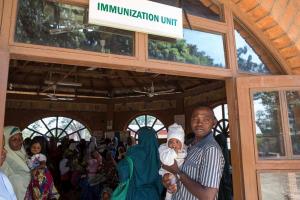NERICC-Nigeria’s panacea to routine immunization and primary health care strengthening.
Abuja 16 April 2019 – Over the past 18 months, Nigeria has recorded substantial improvement in routine immunization (RI) performance. Prior to the establishment of the National Emergency RI Coordination Centre (NERICC) on 04 July 2017, Nigeria’s immunization coverage was very poor and fluctuated significantly over the last decade.
As at December 2016, Nigeria’s national RI coverage stood at 33%, based on 2016/2017 Multiple Indicator Cluster Survey/National Immunization Coverage Survey report. Following this poor performance, the NERICC team prioritized 18 poor performing states for implementation of strategic interventions.
“Since the establishment of NERICC, there has been increased nation-wide immunization coverage,” says Dr Faisal Shuaib, Executive Director (ED), National Primary Health Care Development Agency (NPHCDA).
By March 2019, the figure stood at 54%, based on the 2018 Standardized Monitoring and Assessment of Relief and Transitions (SMART) survey report. The programme aims to reach at least 84% immunization coverage by 2028 through sustained implementation of the current NERICC’s strategic interventions.
In Nigeria, the majority of states with low immunization coverage are located in the Northern region. The 18 states prioritized for implementation of NERICC interventions are Sokoto, Jigawa, Kaduna, Kano and Kastina, Borno, Gombe, Bauchi, Adamawa, Yobe, Zamfara, Kebbi, Kogi, Taraba, Nasarawa, Niger, Bayelsa and Plateau states.
According to the ED, “The main causes of poor immunization in the region are: lack of awareness/knowledge of care-givers on immunization related issues, mistrust or fear, insecurity in some areas, attitude of health workers/managers and also inadequate commitment and ownership by some of the leaders, especially at the sub-national level. NERICC’s strategic interventions are focused towards surpassing Nigeria’s Strategy for Immunization and Primary Healthcare System Strengthening (NSIPSS) projected average of 84% coverage in 2028,” states Dr Faisal Shuaib.
Since the launch of the NERICC plan of action, RI performance has progressively improved in many states. About 30,296 Health workers in all 36 states and the FCT have been trained using the Revised Basic Guide.
“Over 80% of children in at least 10 LGAs across Jigawa State were fully immunized. We are grateful to NPHCDA and partners for this great feat,” states Alhaji Hassan Kwalam Jigawa State Immunization Officer.
The World Health Organization (WHO) has been a strategic partner of NERICC since its establishment. In 2018 alone, WHO supported NERICC to initiate and implement strategic interventions to revamp Nigeria’s RI programme. The Organization has provided working tools and equipment to make the centre operational.
One of NERICC’s interventions, which WHO has been supporting since April 2018, is the Optimized Integrated RI Sessions (OIRIS). There are five (5) key pillars of OIRIS, namely; optimized RI sessions, integration of RI with other services, intensified RI supportive supervision, ownership and accountability. Through OIRIS, states and Local Government Areas (LGAs) health workers and managers are optimizing the conduct of fixed and outreach sessions by removing barriers to access RI services.
“Through the optimized RI sessions, Secondary and Tertiary institutions and urban PHCs are being supported to conduct daily RI fixed sessions to reach more children in their catchment areas. Rural PHCs are also supported to conduct at least one fixed session and one outreach session per week,” says Dr Fiona Braka, WHO Team Lead, Expanded Programme on Immunization.
“About 83% of the Urban PHCs, Secondary and Tertiary institutions in the 18 priority intervention States now offer daily vaccinations, compared to 29% at commencement of OIRIS implementation. In addition, 76% of the planned outreaches have been conducted, compared to 43% at commencement of OIRIS implementation in 2018,” she adds.
WHO’s key focal areas in supporting NERICC in 2019 include: sustained intensified programme management, strengthening of performance through OIRIS, better management of data to improve quality and accountability of intensive mobilization of resources for planned RI activities.



